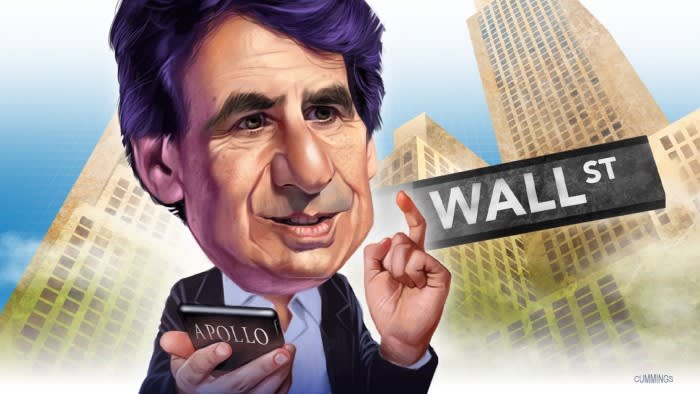Unlock the Editor’s Digest for free
Roula Khalaf, Editor of the FT, selects her favourite stories in this weekly newsletter.
Early in his career, Marc Rowan, co-founder of Apollo Global, worried that he had missed the greatest windfalls in finance.
“I remember getting out of business school in 1984 and thinking ‘God, I am just too late’,” Rowan once said of his early days as an associate at Drexel Burnham Lambert. “‘All the money’s already been made.’”
The hard-charging investment bank led by “junk bond king” Michael Milken fuelled the 1980s era of financial risk taking before it spiralled into bankruptcy in 1990. But Rowan’s moment to make serious money would eventually come almost two decades later. Shortly after the collapse of Lehman Brothers in September 2008, he delivered a speech to young financiers in which he declared: “You want chaos, you want everything shaken up, you want the system to be brought down and rebuilt again. This is a time of incredible opportunity.”
Rowan would go on to seize the chance offered by the banking crisis to re-engineer finance according to his own designs.
This week, the 62-year-old, who was born on Long Island and educated at the University of Pennsylvania’s Wharton School of Business, outlined his plans for Apollo Global, the sprawling New York-based investment group he oversees. We are, he believes, on the cusp of a new age in Wall Street, in which the power of the banking industry is ebbing.
“US banks today [represent] less than 20 per cent of debt capital to US businesses and consumers,” Rowan has said. Asset managers are replacing them as the vital cogs in the flow of credit.
Putting Apollo, once a small private partnership mostly focused on leveraged buyouts, at the centre of global financing markets would cap a story that began more than three decades ago when Drexel’s swift descent into bankruptcy caused prices on low-rated bonds to plunge.
One prominent victim of the investment bank’s collapse was an insurer called Executive Life that had soaked up “junk” debts originated by Drexel. Together with colleagues from Drexel, Rowan, then jobless, persuaded the French bank Credit Lyonnais to back a firesale takeover of the insurer, a manoeuvre that allowed them to profit from a swift recovery in the debts they had sold to the group years earlier.
The deal was a financial success and made a name for Rowan and his partners, including billionaires Leon Black and Joshua Harris. But it would also lead to scandal. Credit Lyonnais was later charged with misleading insurance policyholders and regulators on aspects of the bid. Several executives pleaded guilty to financial crimes, but Rowan and his partners were never implicated, and went on to create Apollo.
Through the 1990s and 2000s, Rowan oversaw some of the firm’s biggest deals, including the creation of ski resort operator Vail Resorts and Sirius Satellite Radio, where he personally courted and signed the infamous “shock jock” Howard Stern. He kept a much lower profile than Black and Harris, preferring to cultivate a professorial image with his trademark sweaters and khakis. Friends say he would have been an architect if he hadn’t succeeded in finance. But his reticence didn’t prevent Apollo earning a reputation as the most ruthless negotiator on Wall Street.
In the aftermath of the 2008 crisis, Rowan turned his attention to building an insurer for Apollo that he believed could become an alternative home for less liquid debts. With just $16mn in equity, he created Athene, an insurer that would create a steady flow of premiums for Apollo to invest.
Rowan spent a decade quietly building up Athene until 2020, when he was thrust into the spotlight after details emerged of his partner Black’s close ties to the late sex offender and financier Jeffrey Epstein. Rowan went on a “sabbatical” from Apollo, content to stay in the background and focus on his insurer. When it became clear Black would need to depart, Rowan was tapped to become Apollo’s sole leader upon his return.
Since then, Rowan has sought to lead Apollo away from its private equity roots. It acquired Athene in early 2022 and the insurer, which now carries over $300bn in assets, has become key to Rowan’s vision for Apollo, which now presents itself as a one-stop financing option for large, highly rated companies, as well as those of lower credit quality. He has also sought to remake Apollo’s image on Wall Street so it can attack larger markets, striking co-operative partnerships with banks such as Citigroup and BNP Paribas.
“Behind the scenes, in his intellectual and creative way, he changed the business model of Apollo without being front and centre,” says Richard Handler, chief executive of investment bank Jefferies and a former colleague at Drexel. “He also added another element that reflects who he is: let’s bring some humanity to the company and to our people.”
Others take a more suspicious view of this “friendlier” Apollo. “Apollo has lived in a world where there are only winners and losers, there is no partnership where we all build together and win,” says one financial executive. “Maybe this is a new day for them.”
While Apollo portrays itself as a partner to incumbent banking giants, Rowan made clear on Tuesday that he believes a new order in finance is taking shape.
“In every market, banks are being asked to do less and investors are being asked to do more.”
antoine.gara@ft.com
https://www.ft.com/content/d665af31-0f03-4017-8d31-a6e55e4f327d


